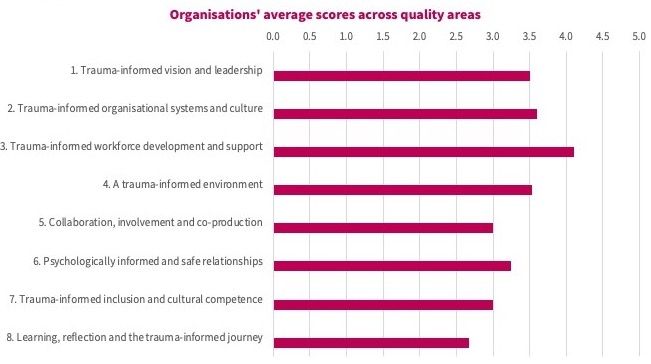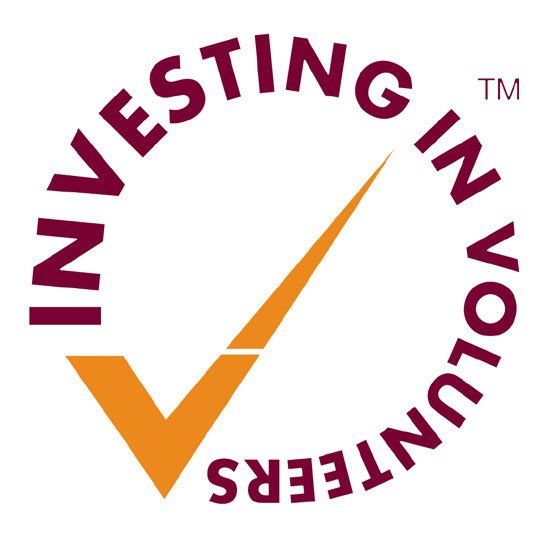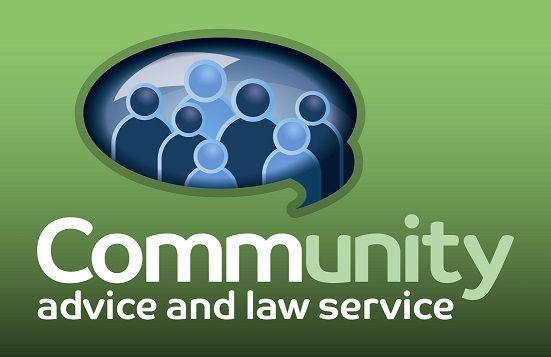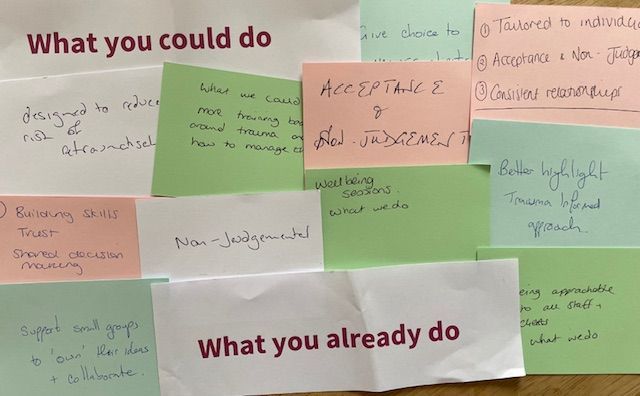Psychologically and trauma-informed organisations: a year-long programme with safe accommodation providers
Supporting workers, ameliorating stress, and providing a more trauma-informed approach - a programme run by Leicester women's organisation New Dawn New Day, and Ideas to Impact.

Highlights
Ideas to Impact and Leicester women's organisation New Dawn New Day ran a year-long trauma-informed programme involving training, a quality framework and reflective practice. The final report can be downloaded below, the highlights are expanded upon in the remainder of the blog.
- There’s a need for more ongoing support for organisations to implement trauma-informed processes over and above short training courses, and aimed at senior staff as well as frontline practioners.
- People welcomed being with those from different organisations to share ideas and to better understand each others’ services.
- Being able to think beyond what happens at the frontline and what trauma-informed management entails was helpful, but there’s still a need to better tailor what this means in individual organisations.
- There were changes at individual, service, and organisational levels for programme participants, and these included changes for people accessing the service
- People’s experience of reflective practice was perhaps most transformative, and what was provided by New Dawn New Day seemed to be quite different from anything they had previously been receiving in their organisations.
Background
While there has been a proliferation of organisations in varying stages of developing psychologically and trauma-informed practice, women’s organisation New Dawn New Day, an early adopter, identified that although there was increasing access to one-off training, ongoing support to organisations to implement trauma-informed practice was lacking. As with any training programme, this can leave organisations coming up against inevitable barriers and questions and not being sure what to do next when trying to put it into practice. In addition, when evaluating the Nottingham Practice Development Unit with BVSC Research Unit, Ideas to Impact noted that trauma-informed practice was something that was seen by some senior staff as something that happened on the frontline rather than infused through the whole organisation.
Leicester City Council also recognised this issue, alongside highlighting that safe accommodation for people experiencing domestic violence, predominantly women, was not always meeting the needs of people with severe and multiple disadvantage. A programme of work carried out by New Dawn New Day and Ideas to Impact was funded under the Domestic Abuse Safe Accommodation Strategy 2022-25. The project had three main strands: a training programme on trauma-informed practice, reflective practice, and the development of an organisational framework with eight areas of trauma-informed practice for organisations to measure themselves against and to aspire to.
Four other organisations were involved, Action Homeless, Leicester City Council’s STAR team, Living Without Abuse, and Women’s Aid Leicestershire, each organisation selected two or three members of staff to be part of the programme. Sessions were monthly, generally with training in the morning and a reflective practice session in the afternoon. There were also workshops with individual organisations where people in different roles assessed themselves with facilitator support against the quality framework.
Best aspects
The best aspects of the programme that participants most appreciated and felt made it a success were:
- Being with others in similar roles in a face-to-face setting
- Having time with members of participants’ own organisations in the training and self-assessment workshops
- The creation of space and accountability
- Tools that can be applied in the organisation
- The link between theory and practice
- Reflecting on own practice and getting ideas from others
- Reading lists and encouragement to read
- The quality and structure of the programme
- The length of the programme compared to other trauma training.
Participant organisations expressed a wish for the support to continue, and some of them have held individual sessions in their organisations since. Ideas to Impact and New Dawn New Day are currently considering how this work can become a longer-term project.
Challenges for participants
- As always, the main challenge for participants was time to be involved, particularly for smaller organisations where managers might be more involved in covering direct service delivery.
- Organisational changes were another factor, in particular because of recommissioning early in the year.
- People also mentioned balancing the wish to implement trauma-informed practice with commissioners’ requirements, where these might conflict – making sure that commissioners were also trained was suggested.
- Limited places for participants on the programme meant that knowledge was unevenly spread across the organisation when they came to implementing systems.
- One organisation was concerned about opening up issues for people accessing the service that there isn’t the capacity to deal with, although this wasn't reflected in the comments from the participants in the programme in putting things into practice.
Suggestions for improvements were mainly around more time and flexibility for the programme, and trauma-training across organisations as a whole.
Reflective practice
My personal experience of reflective practice has been extremely positive, during the initial sessions, I found sharing quite difficult, to go on to learn how to trust within these sessions and support others has been beneficial. The support we have had around reflective practice from New Dawn New Day has been outstanding, their skills and knowledge in the area has enabled us as an organisation to really see the benefits of offering these sessions to our frontline staff.
Reflective practice provided by New Dawn New Day was the element that perhaps had most impact on participants and their organisations, mentioning its impact on reducing vicarious trauma, helping people to work better with people accessing the service, and about how it was likely to improve job retention amongst participants of this programme and in the organisation most widely. It became apparent that people had different conceptions of both reflective practice and clinical supervision, explored in the report. What New Dawn New Day offered that was different from what they were currently receiving was firstly taking an approach that used psychoanalytic concepts such as transference and projection, and what this could tell people about themselves and others, and somatic experience (using physical sensations and emotions) rather than the more common “what happened, what went well, what could be improved” approach. Secondly, having experience of actually delivering the work so that participants didn’t need to spend time explaining this was also helpful.
Safe & Sound – the Trauma-Informed Safe Accommodation Framework
The framework was a great guide to start looking at what we already have in place and identify gaps and ways to improve our organisational trauma- informed practice. We have already made a range of changes and we will continue to work through the standards over the next few months. When we did this workshop on the framework, I loved it. I just thought it was so useful.
The Safe & Sound framework of eight quality areas was originally based on academic and practitioner research and modified as a result of participants’ input throughout the year. Ideas to Impact developed the framework and delivered self-assessment workshops for individual organisations, involving more people across the organisations than just those on the programme. They then chose a few areas to focus on for development.
Things that people liked about the framework included:
- It highlighted where good practice was already taking place
- Being able to look into more detail around support for people
- Having different categories gave a structure that was easy to work with and work out what to do
- Having examples was helpful and thought provoking
- It’s comprehensive and makes a task that feels overwhelming at first more manageable
- Progress can be easily measured, which is useful to present to boards and funders.
Issues about resources to implement some of the practices were mentioned, as was the need to have support to understand how to interpret the requirements,
“We don’t know what we don’t know.”
The chart below shows how confident organisations felt about how they were doing across the eight quality areas, with five as the highest score.

Impact of the programme
The programme had an impact on multiple levels:
- Individually, participants experienced psychological shifts, professionally and personally, affecting their worldview and relationships inside and outside work.
- The broader workforce saw improved wellbeing, potentially enhancing job retention, and a shift towards a holistic organisational approach to trauma-informed working rather than just focusing on trauma-informed practice in frontline work.
- Physical spaces were redesigned with input from service users, fostering understanding and open discussions about trauma. Service improvements included self-care packs and refined assessment methods, while a deeper comprehension of residents' trauma-driven behaviour meant that participants felt that it would lead to reduced evictions.
- Organisational changes included thinking about how board members are aware of the effects of trauma and its implications.
For further information
The Safe & Sound website is under development but contains details of what’s in the framework. Although it was designed specifically for safe accommodation providers, most of the elements are applicable to any organisation.
Ideas to Impact and New Dawn New Day have a range of services to support psychologically and trauma-informed working, get in touch! Ideas to Impact trauma-informed management training can be found here.
For Leicester and Leicestershire organisations we are delivering a trauma-informed series of workshops, including looking at trauma-informed procedures, management and reflective practice. The website needs some amendment at the time of writing - this is a three-day programme, with the correct dates against each of the courses.
Other blogs relating to this include:
- Why you need an organisational approach to staff wellbeing
- How we developed staff wellbeing intiatives at CALS in Leicester following trauma-informed management training.










